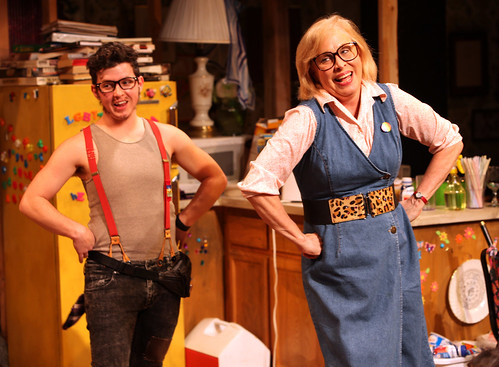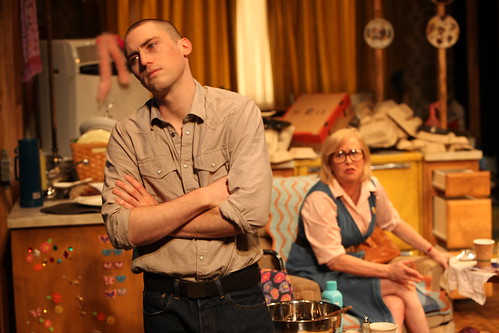Turning on a paradigm in Magic's HIR
EXTENDED THROUGH MARCH 2 Max (Jax Jackson, left) and Paige (Nancy Opel) in the world premiere of Taylor Mac's HIR at Magic Theatre. Below: Isaac (Ben Euphrat) and his mother navigate his bumpy return from war in Afghanistan. Photos by Jennifer Reiley
Max (Jax Jackson, left) and Paige (Nancy Opel) in the world premiere of Taylor Mac's HIR at Magic Theatre. Below: Isaac (Ben Euphrat) and his mother navigate his bumpy return from war in Afghanistan. Photos by Jennifer Reiley
The last time Taylor Mac was in town, he gave us the five-hour Lily's Revenge with glitter, drag queens, a cast of 40 and so much dazzling theatricality that we were able to withstand his absence in the following three years (read my Lily's Revenge review here)
Mac has continued to wow audiences in shows like his two-man outing with Mandy Patinkin or La Ma Ma's acclaimed The Good Person of Szechwan, but the Magic Theatre was able to lure him back to present the world premiere of something entirely different than Lily's Revenge. This time out, Mac is the playwright of HIR (pronounced like "here"), a fairly traditional two-act, two-plus-hour play that seems like a sitcom filtered through Mac's gender-fluid, ragingly intelligent, funny and passionate artistry.
Rather than plot, of which there's not much, HIR focuses instead on characters dealing with change. Isaac (Ben Euphrat has just returned from three years at war working with Mortuary Affairs, and there's a cloud hovering over his discharge. He expects to come home to find his parents and little sister were when he left them, but he's in for a rude shock. The house, in some hot, dusty California suburb, is a complete mess, and chaos reigns. Dad (Mark Anderson Phillips), formerly an abusive brute, has had a stroke that has changed him completely. He can't speak much, he moves with difficulty and he's living out his wife's revenge fantasy.
That revenge mistress would be Paige (Nancy Opel), a woman who has found her strength and, possibly, lost her mind. She refuses to clean the house, do laundry or cook because she'd rather work for a nonprofit. She emasculates her husband by putting him in glittery, clown-y makeup and by making him wear nightgowns. When she bothers to change his diaper, she just hoses him down in the backyard. She's giving him estrogen, and when he misbehaves, she grabs the squirt bottle as if she were scolding a cat.
She's also homeschooling Maxine, who is now Max. That is, perhaps, the biggest change under this family roof. Seventeen-year-old Max (Jax Jackson) is taking testosterone shots and making the transition. Paige thinks this is fantastic, and Max's brave journey has been an inspiration to her own. She even has a sense of humor about it all: "I credit the Cheetos," she says. "How could we feed our children fluorescent food and not expect a little gender confluence?" Full of enthusiasm for what she calls "an alphabet of genders," Paige explains the new world of pronouns to Isaac. The word "ze" (pronounced "zay") replaces he or she and "hir" replaces her or him.
Says Paige, "Any breach in decorum will cause hir to write in hir blog about how awful hir troglodyte fascist hetero-normative mother is. It's fantastic."
This section of the play, where Paige's zeal is manic and marvelous and as touching as it is fun, is the best of the evening. Learning for Paige was "like being baptized only without the male-dominated, hegemonic paradigm. Everyone is a little bit of everything, Isaac. We're simply us. Hir." Having a transgender child has pulled the veil from Paige's eyes, and her years as an abused wife and cowering woman are over. Gender barriers have crumbled. She has seen that she can be all things, and she has fully come into her power.
She even subverts the whole notion of American life in a single sentence: "You can't do anything in life or to the world if your original intent is not to actually do the thing but to do better than the thing." She is, as she might put it, fantastic.
But all this happens about halfway through Act 1. We still need to have Isaac rebel against all this change and begin protecting and nurturing his father (who, by the way, also used to beat him along with his mother and sister) and putting things back the way they used to be, the way they are, to his mind, "supposed" to be.
Alas, nothing in Act 2 reaches the heights of Act 1 except maybe the construction of a sheet palace, the wearing of festive wigs and the presentation of a shadow puppet show. More focus shifts to Arnold (the dad), and there's a struggle between the evolved and the "normal" that cracks the dynamic-duo nature of Paige and Max's big adventure. Isaac is the cause of that crack. He represents the way the flawed, narrow world works. Paige sees herself and Max as the new, "beyond gender, beyond possessions, beyond the past." But the pull of home, which Paige calls "a mechanism of control," and the notion of family exerts a strong pull on Isaac, who in turn exerts a strong pull on Max.
The bleak ending isn't so much the problem as the lack of clarity. Max goes out of focus, as does Paige, and Isaac doesn't really grow or change in any interesting way. He's damaged by war and needs his old life and family back. He's an empathetic person, even toward his father, and he's doing his best to wrap his head around Max's new place in life. But Mac can't bring all of these things together as effectively in the end as he's done in bringing them all together.
The production itself, directed by Niegel Smith, gets a big visual boost from set designer Alexis Distler, who has created a dilapidated "starter home" (that never got started), with see-through walls exposing the living room behind the kitchen, the hallway to the bedrooms and the general material oppression of middle-class life. The actors fill that space with tremendous energy, especially Opel and Jackson. They seem truly inspired by the twin journeys of Paige and Max, while Euphrat and Phillips, both strong actors, feel stunted by the way they cling to traditional male roles (with the exception being Phillips' utter glee during the dress-up sheet fort/puppet show scene).
It seems HIR is not quite finished, but Mac has delivered a smart, incisive comedy that brings potentially mind-expanding perspectives to the stage.
FOR MORE INFORMATIONTaylor Mac's HIR continues an extended run through March 2 at the Magic Theatre, Building D, Fort Mason Center, Marina Boulevard at Buchanan Street. Tickets are $20-$60. Call 415-441-8822 or visit www.magictheatre.org.
